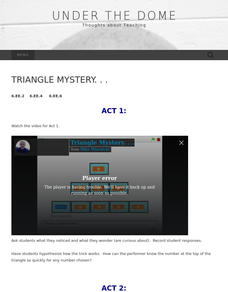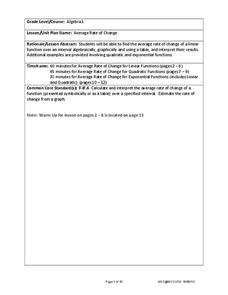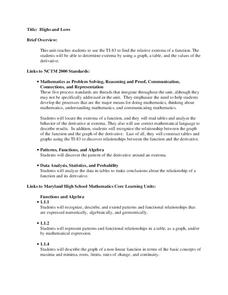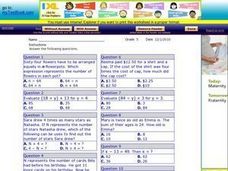EngageNY
Writing Addition and Subtraction Expressions
Symbols make everything so much more concise. Young mathematicians learn to write addition and subtraction expressions — including those involving variables — from verbal phrases. Bar models help them understand the concept.
EngageNY
True and False Number Sentences II
Substitution is still the method of choice to verify number sentences. The detailed lesson has young mathematicians determining conditions for when number sentences are true or false through substitution. They learn to express these...
EngageNY
Writing and Expanding Multiplication Expressions
Find out what's so standard about standard form. Scholars learn to write multiplication expressions with variables in the 10th lesson in a series of 36. They use different symbols for multiplication and translate between standard and...
Chemistry Collective
Virtual Lab: Determination of the pH Scale by the Method of Successive Dilutions
Where did the pH scale come from? Take a deeper look at a most important measure of ion concentration using a simulated physical determination. Young chemists prepare a series of dilutions after determining a dilution factor for the...
EngageNY
Mid-Module 3 Assessment Task
Time to take a pulse check. The mid-module assessment allows pupils to check where their knowledge falls for the first portion of the module. The 10th resource in a series of 23 covers content from the binomial theorem to hyperbolas....
Under the Dome
Triangle Mystery ...
Build a pyramid based on sums. Individuals watch a video of a computer program that creates a pyramid of numbers based upon a starting number. The scholars develop a hypothesis on how the number trick works and share their thoughts on...
EngageNY
Properties of Inequalities
Class members explore the meaning of inequality by comparing numbers and building number sentences. Using number cubes, pupils find numbers and compare them using inequality symbols. As the activity continues, operations are added to...
EngageNY
Generating Equivalent Expressions II
Discover how to apply the commutative and associative properties to generate equivalent expressions. The second lesson in the 28-part module asks pupils to rearrange an expression by grouping like terms. From there, they can combine...
West Contra Costa Unified School District
Average Rate of Change
Learners investigate average rates of change for linear functions and connect the concept to slope. They then determine average rates of change in quadratic and exponential functions.
West Contra Costa Unified School District
Graphing Family of Functions
Functions have families, too. Learners first graph the parent functions for linear, quadratic, and cubic functions, and then use vertical translations to graph families of functions.
CK-12 Foundation
Finding and Defining Parts of a Polynomial Function Graph
So many things to remember when graphing polynomials and this guide gives a helping hand to do so. The packet goes through examples and explains things like critical values, end behavior, and multiplicities. There are image links and...
Mathematics Vision Project
Module 1: Sequences
Take steps into sequences. An 11-lesson unit builds upon pupils' previous understanding of writing expressions to develop the idea of sequences. The resource explores both arithmetic and geometric sequences using recursive and explicit...
CK-12 Foundation
Patterns and Expressions: Cookie Jars
It's okay to get caught with your hand in a virtual cookie jar. Pupils use an interactive to drag cookies from two cookie jars onto a plate. They investigate how an expression representing the number of remaining cookies changes as users...
CK-12 Foundation
Repeating Decimals: Does 1 equal 0.999... ?
Six questions make up a challenging interactive that tests scholars' knowledge of repeating decimals. Mathematicians answer true or false and multiple-choice questions with help from a tool that highlights decimal movement in an...
Radford University
Movie Projector Cost
Small groups analyze the attendance at a movie theater and determine the amount of money made for per show. Team members calculate the number of shows it would take for a theater to make a profit after purchasing a new digital projector....
Curated OER
Highs and Lows
Solve problems using integration and derivatives. By using calculus, learners will analyze graphs to find the extrema and change in behavior. They then will identify the end behavior using the derivatives. Activities and handouts are...
Math Drills
Linear Equations ax = c (A)
Skills drills help math learners become adept at solving equations. This worksheet provides 15 simple linear equations with one variable each. Learners simply solve them. It should not take long, therefore you may want to keep this on...
Curated OER
Weaving a Story
It's time to investigate patterns! First and second graders construct a paper weaving using a hundreds chart, then use the Ti-10 calculator to make patterns such as adding 3 each time. Learners remove multiples of three from the hundreds...
Curated OER
Equation Word Problems, Vol. 2
Use this equations worksheet to have your learners solve word problems containing equations with variables. They complete 10 multiple choice questions.
Curated OER
Equation Word Problems, Vol. 1
Learners solve word problems and regular number problems having to do with equations with variables. They complete 10 problems.
Virginia Department of Education
Relationships Round Robin
Mathematics is all about patterns. Young mathematicians analyze geometric patterns to write algebraic expressions. They use the expressions to predict future stages of the patterns.
Math Drills
Linear Equations a/x = c (A)
Here is a linear equations worksheet in which learners problem solve and calculate the answers to twenty linear equations with various variables.
Math Drills
Simple Linear Equations (C)
Learners work through each of the 18 practice problems to build skills needed to solve linear equations with one variable.
Scholastic
Study Jams! Order of Operations
Please excuse my dear Aunt Sally! Sort of like an animated slide show, this lesson walks fifth graders through the order of operations. Also included are a sing-along karaoke video, key vocabulary with definitions, and a seven-question...























